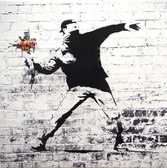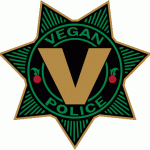 A standard definition of veganism is that ‘the word “veganism” denotes a philosophy and way of living which seeks to exclude — as far as is possible and practical — all forms of exploitation of, and cruelty to, animals for food, clothing or any other purpose; and by extension, promotes the development and use of animal-free alternatives for the benefit of humans, animals and the environment. In dietary terms it denotes the practice of dispensing with all products derived wholly or partly from animals.’
A standard definition of veganism is that ‘the word “veganism” denotes a philosophy and way of living which seeks to exclude — as far as is possible and practical — all forms of exploitation of, and cruelty to, animals for food, clothing or any other purpose; and by extension, promotes the development and use of animal-free alternatives for the benefit of humans, animals and the environment. In dietary terms it denotes the practice of dispensing with all products derived wholly or partly from animals.’
Many vegans advocate welfare campaigns that promote better treatment for non-human animals from within that system of exploitation, (in different possibly less harmful ways) and it is interesting to consider how this fits into vegan philosophy and practise. The issue of animal welfare is often framed as caring about non-human animals, but there is a difference between caring about animals within the constraints of that system of exploitation, and the caring and opposition that can take place when viewed from an animal rights perspective.
The animal rights movement has sometimes been called the ‘animal confusion movement’, because vegans have a tendency to support campaigns or organisations that make the claim ‘we are all heading in the same direction’, so all animal campaigns are necessarily good campaigns, because they raise awareness of the situation of exploited animals. However, whilst it is true that awareness is being raised, it is difficult to identify their usefulness when so many different messages compete within that space.
So for instance, within the different organisations, there is support for ending dolphin slaughter in Japan, whilst others support welfare campaigns for pigs and chickens in the United States. There are campaigns to stop eating dogs in China, but organisations also promote regulation of the dairy industry. There is support for campaigns freeing orcas, but they concurrently overlook the situation of penguins or sea lions. There is also opposition to welfare reforms for the orcas at Seaworld. Whaling should end. Go vegetarian! Meatless Monday. Awards for ‘humane’ meat distributors. Go vegan! Stop live exports! Empty the tanks! Ban bullhooks. Ban snares. Ban fox hunting. Stop the cull. Abolish vivisection. Go ‘cruelty free’. Don’t eat illegally caught fish. Stop shark finning. Save moon bears.
These campaigns are usually based on the sound intentions people have toward caring about non-human animals. However, many ‘animal rights’ organisations present a disparate message by combining animal rights and welfare positions, and adopt a different view on each issue, sometimes welfare, sometimes abolition or rights based, and sometimes no position at all. Within these groups it is interesting to look for the question of why animals should be used at all? Or is it clear from their activities how they believe that issue can best be resolved?
The messages arising from the ‘animal rights’ movement are not always aligned to veganism; and it is difficult to expect people to understand what we are campaigning for when this is the accepted approach. The entanglements of welfare and rights create complexity, and complex situations have a tendency to perpetuate the status quo. This situation can also act as a disincentive for people to continue their own critical journey around animal rights in favour of passing responsibility to those with ‘expertise’, or the ‘professionals’, so people join mainstream organisations and take part in their campaigns rather than valuing their own ideas, and deciding what they believe needs to happen. One consequence of this situation could be that people end up supporting sexist, racist, classist and ableist campaigns, because the welfare/rights approach tends to support the view that to be critical is (amongst others) negative, divisive, and inherently harmful to animals.
It could be said that animals have moved out of focus in favour of a corporate approach of growth and income maximisation, and this may explain how campaigning organisations have chosen the various approaches within their overall ‘strategy’. For if they believe ‘improving’ the welfare of pigs is the way forward, why not regulate and legislate for humane dog farming in China? Or do the same with fur farming? Why do those industries require abolition? Why does the campaign against orca exploitation not recognise the desperate welfare agenda of Sea World in its attempt to placate protesters and consumers? The very same welfare reforms that are utilised to placate people concerned with other forms of animal consumption.
If you take the perspective of animal use, then it is a position that all animal use/exploitation should be avoided as far as is possible and practical, which requires the recognition of intrinsic rights (1). It is clear that we are not trying to achieve increased regulation or improved welfare, we are instead campaigning to abolish that exploitative industry, whilst demonstrating an alternative way to live. Of course it is better if animals suffer less within that system of exploitation, and by using the orca example we can argue that can happen by promoting abolition. Too many times we have been sucked in by an industry that has callously used the fact we care about animals to help perpetuate that system of exploitation (2).
When we take a clear position on ‘use’ we can talk about abolishing animal entertainment that allows us to talk about orcas in a way that includes sea lions and penguins, or to talk about penguins that allows us to include sea lions, orcas, pigs, cows and dogs. When we underpin the connections between various forms of animal exploitation with the vegan philosophy, we provide that necessary link to animal liberation. This allows us to go further and look at the structural issues at play that maintain the system of animal exploitation. So for instance, how the animal industry collaborates with government, and how laws sustain exploitative practices. How power relations mean that animals can be put into zoos without any genuine consideration for their own interests. How animals become commodities and how that allows us to use them as we see fit. We can recognise the issues with hierarchy and division and explore how that applies to other social movements. We can do these things because we are not bogged down by welfare reform.
Sometimes it is believed that if we are opposed to the exploitation of animals it follows that we cannot consider the well being of animals in those situations to which we are opposed. The reason most of us are activists is because of the situation non-human animals find themselves, and we have been motivated to do something about that. But we can help animals without engaging in the welfare campaigns that are concerned with treatment. So rescuing animals is a good thing to do, exposing situations of animal exploitation, supporting sanctuaries, organising film showings, protests and outreach events, those (single issue) campaigns based on abolishing certain forms of animal use when they are codified with vegan principles (3).
This means to say that we can create campaigns that are based on vegan philosophy. That doesn’t mean that *veganism* itself needs equal prominence in any campaign, but it does need to be signposted for people to see we are not dividing animals into groups that we care about whilst overlooking others, (essentially a class based speciesism) or failing to provide the means to address the issue of animal exploitation in the most effective way (veganism).
The property paradox.
So whilst many animal rights organisations do some good things, their overall strategy is flawed. As vegans we ought to reject the commodity status of animals, but that happens to be something welfare campaigners (and incidentally vegetarians) implicitly accept within their own campaigns. This is an irreconcilable position (4) because they not only fail to question or challenge the property status of animals, they are actually engaging in, and reinforcing that situation.
We can choose not to support the confusing welfare/rights organisations that implicitly reinforce the property status of animals, but that does not mean the well resourced ‘mainstream’ welfare campaigns cannot be useful for animal rights activists in various ways. We can discuss and examine their pitfalls, and notice how they have the potential to be useful vehicles for promoting veganism and animal rights.
One example could be a campaign like Meat Free Monday, which isn’t particularly useful to vegans as it stands. However, where it can be useful is when we convince the cafes taking part in the promotion to veganise their extra vegetarian options, therefore appealing to a market of meat eaters, vegetarians and vegans. You can then ask them to put those vegan dishes on the menu all week, so that it becomes a destination for vegans who then demand (5) more and different types of food.
Other welfare campaigns can be approached in different ways, where we provide a more radical animal rights message, even though we don’t endorse or promote the campaign itself. We can use that opportunity to promote ideas (6) to people that are already thinking and acting along the lines of ‘helping animals’. This is an example of the ‘strategic’ campaigning that people sometimes believe is not compatible with positions of abolition. Where it is possible to go out into the world and find different ways to promote animal rights that is a reflection, rather than a compromise of vegan philosophy.
(1) That is, we don’t have the right to affirm the exploitation and consumption of non–human animals.
(2) Farmers go so far as to sell animals at above market prices so they can be saved from the abattoir. The following day the sheds are replenished, whilst the practice becomes more profitable and attractive. This can allow the farmer to appear more ‘compassionate’ or beyond criticism, because activists are reliant on the farmer’s goodwill to allow them to save animals.
(3) It is also worth considering that campaigns underpinned by veganism can deter racists from getting involved, because the philosophy of veganism is aligned with that of the broader social justice movement.
(4) It requires the rejection of vegan philosophy.
(5) A demand supplemented by meat reducers, vegetarians and flexitarians.
(6) We’re introducing veganism and animal rights ideas for people to think about, and endorsing them through our own practise. The idea of incremental change, where people mull over these issues and make changes on their own terms is something Tom Regan called muddling, which he placed alongside DaVincians and Damascans as the way people become animal rights advocates.
Further references:
‘From animals to anarchism‘ by Watkinson and O’Driscoll (2014)
 Welfare campaigns (for example those run by HSUS and CIWF) are not generally of particular interest for animal rights advocates. Welfare campaigns function to promote less bad treatment for animals, and that is essentially what they do. A rights perspective would say that we cannot promote welfare (from within the industry of exploitation) because to do so we would first have to accept the violation of that individual’s intrinsic rights.
Welfare campaigns (for example those run by HSUS and CIWF) are not generally of particular interest for animal rights advocates. Welfare campaigns function to promote less bad treatment for animals, and that is essentially what they do. A rights perspective would say that we cannot promote welfare (from within the industry of exploitation) because to do so we would first have to accept the violation of that individual’s intrinsic rights.










